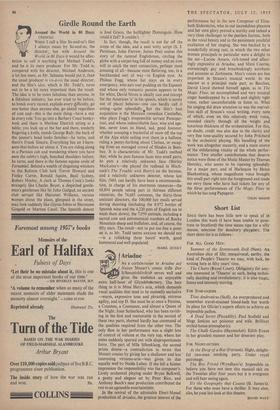Girdle Round the Earth
Around the World in 80 Days. (Astoria).
WHEN I call a film So-and-so's film I always mean by So-and-so, the director;_ but with Around the World in 80 Days it would be affec- tation to call it anything but Michael Todd's, and he is its mere producer. For Mr. Todd is, compared with his director, Michael Anderson, a lot less mere, as Mr. Salteena would put it, than the usual producer is vis-à-vis the usual director, and the film's idea, which is Mr. Todd's, turns out to be a lot more important than the result. The idea is to be more fabulous than anyone, in a fabulous industry, has ever tried to be before, to break every record, explode every (lifliculty, go one better than anyone else, go ahead regardless of cost and—this is the main thing—have a star in every role. You go into a Barbary Coast hanky- tonk and there is Marlene Dietrich sitting at a table; you look up at the bar and there, tenderly fingering a knife, stands George Raft; the back of the pianist's head looks familiar—he turns, and there's Frank Sinatra. Everything has an I-have- seen-that-before air about it. You are riding along in a Parisian cab and wondering where you have seen the cabby's high, hunched shoulders before; he turns, and there is the famous equine smile of Fernandel. Behind a wealth of disguising whiskers in the Reform Club lurk Trevor Howard and Finlay Currie, Ronald Squire, Basil Sydney, Robert Morley. A clerk at Thomas Cook's looks strangely like Charles Boyer, a dispirited gentle- man's gentleman like Sir John Gielgud, an ancient club servant like Harcourt Williams, various women about the place, glimpsed in the street, may look suddenly like Glynis Johns or Hermione Gingold or Martine Carol. The Spanish dancer
is Jose Greco, the bullfighter Dominguin. How could it fail? It couldn't. • In fact, though, the result is not far off the scope of the idea, and a neat witty script (S. J. Perelman, John Farrow, James Poe) makes this story of the ramrod Englishman, circling the globe with a carpet-bag full of money and an iron will to catch the next connection, perhaps most amusing of all—because most flattering, too, in a backhanded sort of way—to English eyes. As Phileas Fogg, whose hat stays on in every emergency, who eats suet pudding on the Equator and whose only romantic passion appears to be for whist, David Niven is ideally cast and (except for the American 'a' in his speech, which is surely out of place) behaves—one can hardly call it acting—quite splendidly.. But the film's best acquisition is the Mexican comedian Cantinflas, who plays Fogg's irrepressible servant Passepar- tout, and whose indescribable face, wise and age- less, never loses its bland, sad, good humour, whether scooping a bucketful of snow off the top of the Alps while sailing over them in a balloon, riding a penny-farthing about Chelsea, or escap- ing from an outraged crowd of Hindus in Bom- bay. It is characteristic of Mr. Todd's method that, while he puts famous faces into small parts, he puts a relatively unknown face (Shirley MacLaine's—she played the redhead in Hitch- cock's The Trouble with Harry) on the heroine, and a relatively unknown director, whose last film, 1984, can hardly have been a recommenda- tion, in charge of his enormous resources—the 68,894 people taking part in thirteen different countries, the 74,685 costumes, the thirty-three assistant directors, the 100,000 hot meals served during shooting (including the 8,972 bottles of Spanish wine and the 4,220 pots of English tea to wash them down), the 7,959 animals, including a sacred cow and astronomical numbers of Rocky Mountain sheep and buffaloes, and, of course, the fifty stars. The result—not to put too fine a point on it, as Mr. Todd seems anxious we should not —is a rollicking three hours' worth, good humoured and well populated.
ISABEL QUIGLY














































 Previous page
Previous page